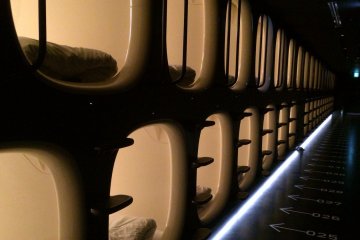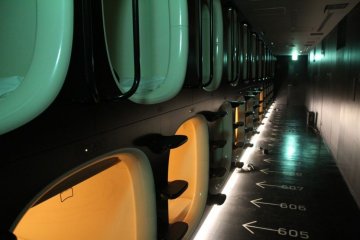Anyone who's done some research on options for accommodation in Japan is probably familiar with the two words "capsule hotel." The manner in which these ultra cheap boxes with literally nothing but a mattress (and a small TV protruding from the ceiling) in them are packed together is reminiscent of how people are packed in Japan's largest cities like sardines, and perhaps you might be tempted to stay in one just for the experience.
But if you don't want to feel as if you're stuck in an MRI scanner and want a little bit more breathing room while still traveling on a tight budget, Japan's options are limited. Hostels might not provide enough privacy, while business hotels are nice but you can still find accommodation for cheaper. And as for Japan's notorious love hotels - well, they're also relatively cheap, but only if you can handle the kinky surroundings and the awkward noises that you may or may not hear.
If you don't like any of the above, you're not out of luck - some of Japan's newer and more creative options might be more appealing to you.
A combination of a weak yen and the country's amped up efforts to increase tourism after the devastating 2011 Great Tohoku Earthquake and in preparation for the 2020 Tokyo Summer Olympics has sent hotel prices rising in recent years, much to the dismay of the increasing number of foreign tourists. With building new hotels costing too much money and time, some Japanese companies such as Sankei Buildings and First Cabin have smartly resorted to converting office buildings into small but stylish places to stay.
Staying at one of these office hotels are almost the same price as staying at a capsule hotel, but the pods are more pleasing to the eye and more spacious. An added incentive is that many of these office buildings are located in urban areas, making it easy for guests to get around during the day. 3,600 yen will get you a 12 square-meter room in Grids (plus a shared toilet and shower), not far from Akihabara, while a "splurge" option in the same hotel is a 28 square-meter room where up to four futons can be laid - making it possible for families to stay there too - for 5,000 yen. Other office hotels include the First Cabin and Sakura Hotel chains, as well as the Nine Hours (their name is self-explanatory - guests can stay up to 9 hours) hotels in Kyoto and Narita Airport, which are very similar to capsule hotels but more stylish.
So if you're planning to visit Japan on a budget can afford an "upgrade" over capsule hotels, why not try one of Japan's new office hotels, something that could be the latest in line of the country's countless quirky things? That is, of course, only if the idea of sleeping over at an office doesn't conjure up painful memories of working overtime.








